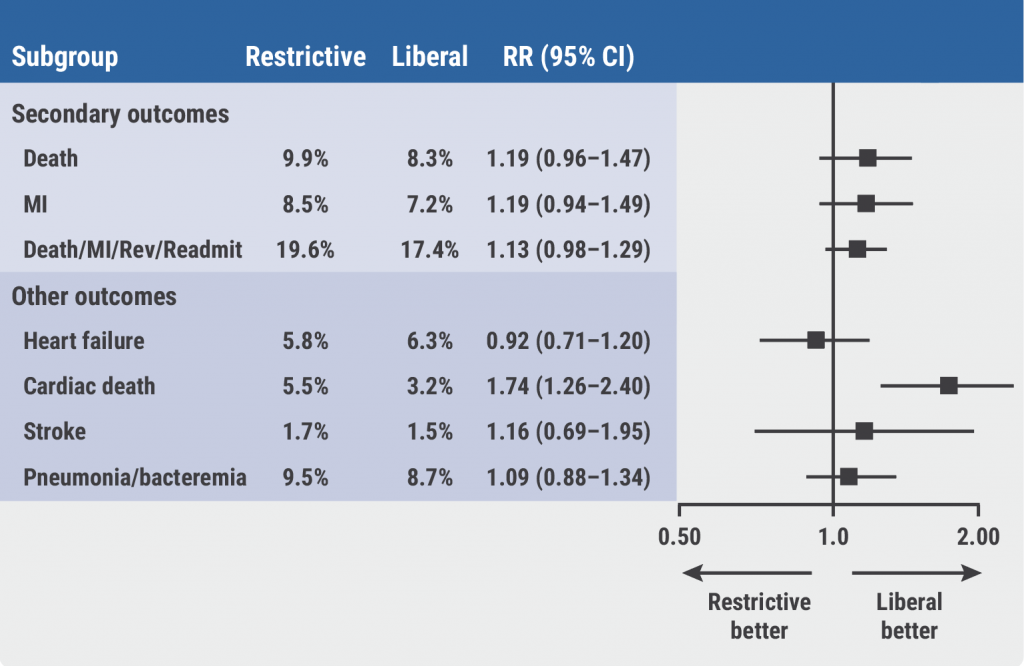https://doi.org/10.55788/eeefa4c0
The current standard of care for rheumatic heart disease-associated AF is vitamin K antagonist therapy; however, it can be difficult to administer because of many dietary and pharmacologic interactions, and requires regular blood sampling to monitor anticoagulation status. Prof. Ganesan Karthikeyan (All India Institute of Medical Sciences, India) presented the findings of the phase 3 INVICTUS trial (NCT02832544), which compared cardiovascular outcomes in patients with rheumatic heart disease and documented AF or atrial flutter at any time. In addition, at least 1 of the following criteria was also required: a CHA2DS2VASc score of at least 2, mitral stenosis with a mitral-valve area of no more than 2 cm2, or echocardiographic evidence of either left atrial spontaneous echo contrast or left atrial thrombus. Key exclusion criteria were the presence of a mechanical heart valve or the likelihood of receiving one within the next 6 months, the use of dual antiplatelet therapy, treatment with dual strong inhibitors of CYP3A4 and P-glycoprotein, and renal insufficiency with an estimated glomerular filtration rate, <15 mL per minute. Participants were randomised to either receive treatment with factor Xa inhibitor rivaroxaban or with a standard vitamin K antagonist as an open-label design. The primary efficacy endpoint was a composite of stroke, systemic embolism, myocardial infarction, or death from vascular (cardiac or non-cardiac) or unknown causes. The primary safety endpoint was major bleeding according to the ISTH.
Of the 4,531 patients included in the final analysis, with average follow-up of 3.1 years (mean age 50.5 years, 72.3% women), the primary endpoint analysis favoured treatment with vitamin K antagonist over rivaroxaban (HR 1.25; 95% CI 1.10–1.41; P<0.001), and as such, the proportional hazards assumption was not met. More patients in the rivaroxaban group than in the vitamin K antagonist group had a stroke (90 vs 65 patients, respectively), which was almost entirely attributable to a higher rate of ischaemic stroke in the rivaroxaban group (74 vs 48, respectively). Furthermore, a higher incidence of death was reported in the rivaroxaban arm than in the vitamin K antagonist arm (difference -72 days; 95% CI -117 to -28). The rate of major bleeding was similar in both arms. The mechanism for differences in mortality in the context of similar bleeding remains an open question.
- Karthikeyan G, et al. INVICTUS - Rivaroxaban versus VKA for rheumatic atrial fibrillation. Hot Line Session 5, ESC Congress 2022, Barcelona, Spain, 26–29 August.
- Connolly SJ, et al. N Engl J Med 2022;387:978-988.
Copyright ©2022 Medicom Medical Publishers
Posted on
Previous Article
« New anticoagulant safe and maybe effective: PACIFIC-AMI and PACIFIC-Stroke outcomes Next Article
Meta-analysis of DELIVER and EMPEROR-Preserved »
« New anticoagulant safe and maybe effective: PACIFIC-AMI and PACIFIC-Stroke outcomes Next Article
Meta-analysis of DELIVER and EMPEROR-Preserved »
Table of Contents: ESC 2022
Featured articles
ESC Clinical Practice Guidelines
Prevention of VT and sudden cardiac death: the new recommendations
New and first ESC cardio-oncology guideline
The 2022 ESC/ERS guidelines for the diagnosis and treatment of pulmonary hypertension
Cardiovascular assessment and management of patients undergoing non-cardiac surgery
Heart Failure
Old dogs, new tricks: Acetazolamide plus loop diuretics improves decongestion
No effect of neprilysin inhibition on cognition
Dapagliflozin DELIVERs for HFmrEF/HFpEF
Meta-analysis of DELIVER and EMPEROR-Preserved
Anticoagulation
Rheumatic heart disease-associated AF: standard-of-care holds ground
New anticoagulant safe and maybe effective: PACIFIC-AMI and PACIFIC-Stroke outcomes
AXIOMATIC-SSP: Reducing risk of ischaemic stroke with factor XIa inhibition?
Evolving evidence for P2Y12 inhibition in chronic coronary syndromes: PANTHER
Prevention
Danish study suggests starting CVD screening before age 70
Polypill SECUREs win in secondary prevention in elderly
Long-term therapy with evolocumab associated with lower CV mortality
ARBs + beta-blockers may delay Marfan syndrome aortic root replacement
ENTRIGUE: Subcutaneous pegozafermin in severe hypertriglyceridaemia
Artificial Intelligence & Digital Health – What Is New
First RCT evidence for use of AI in daily practice
AI-enhanced echography supports aortic stenosis patients
Ischaemia
Medical therapy versus PCI for ischaemic cardiomyopathy
Allopurinol disappoints in ALL-HEART
Conservative or invasive management for high-risk kidney disease patients with ischaemia?
Genotype-guided antiplatelet therapy in patients receiving PCI
Other HOTLINE Sessions
BOXing out oxygen and blood pressure targets
Coronary CT angiography diagnostics compared head-to-head
High-dose influenza vaccine: mortality benefit?
FFR-guided decision-making in patients with AMI and multivessel disease
Related Articles

June 15, 2022
Chocolate Touch vs Lutonix catheters
© 2024 Medicom Medical Publishers. All rights reserved. Terms and Conditions | Privacy Policy
HEAD OFFICE
Laarderhoogtweg 25
1101 EB Amsterdam
The Netherlands
T: +31 85 4012 560
E: publishers@medicom-publishers.com

